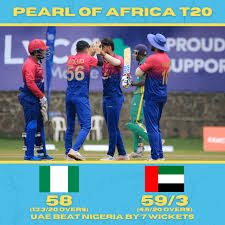Understanding the Dynamics of UAE vs Nigeria

Introduction
The ongoing global interplay between nations has seen the United Arab Emirates (UAE) and Nigeria emerge as two significant players in their respective regions. The UAE, often regarded as an economic powerhouse in the Middle East, contrasts sharply with Nigeria, Africa’s most populous nation and its largest economy. This article delves into the multifaceted relationship between the UAE and Nigeria, assessing their economic ties, cultural exchanges, and political engagements.
Economic Overview
The UAE’s economy is heavily diversified with significant contributions from non-oil sectors, including tourism, aviation, and financial services. In recent years, it has become a hub for international trade and investment, offering a stable environment for foreign investors. On the other hand, Nigeria’s economy is largely reliant on oil exports, which account for over 90% of its foreign exchange earnings. However, with an ever-growing population and rich agricultural resources, Nigeria is making strides towards diversifying its economy.
Trade Relations
Trade between the UAE and Nigeria has witnessed substantial growth. In 2021, bilateral trade reached nearly $2 billion, with a significant upside potential due to Nigeria’s vast market and the UAE’s strategic location. The UAE serves as a critical gateway for Nigerian goods seeking access to the Middle Eastern and Asian markets. Additionally, numerous Nigerian businesses are setting up operations in the UAE, drawn by the favourable business conditions and ease of doing business.
Cultural and Educational Exchange
Cultural ties between the two nations have also deepened, as evidenced by numerous cultural initiatives and partnerships in education. The UAE is home to a considerable Nigerian expatriate community, contributing to a vibrant cultural exchange. Educational ties have strengthened with Nigerian students increasingly pursuing higher education in UAE institutions, benefiting from world-class education and diverse cultural settings.
Political Engagement
Politically, both nations have maintained diplomatic relations since Nigeria’s independence in 1960. They engage in collaborative development projects, focusing on security issues and economic cooperation. The UAE’s investments in Nigeria’s infrastructure and technology sectors have been pivotal in fostering closer ties. Additionally, both countries share mutual interests in combating terrorism and promoting regional stability.
Conclusion
The relationship between the UAE and Nigeria epitomises the potential for growth through collaboration amidst a backdrop of global economic shifts. As the UAE continues to diversify its economy and Nigeria strives for stability and growth, their partnership is poised to deepen in the coming years. This synergy promises to enrich both nations economically and culturally, offering myriad opportunities for businesses and individuals alike.








